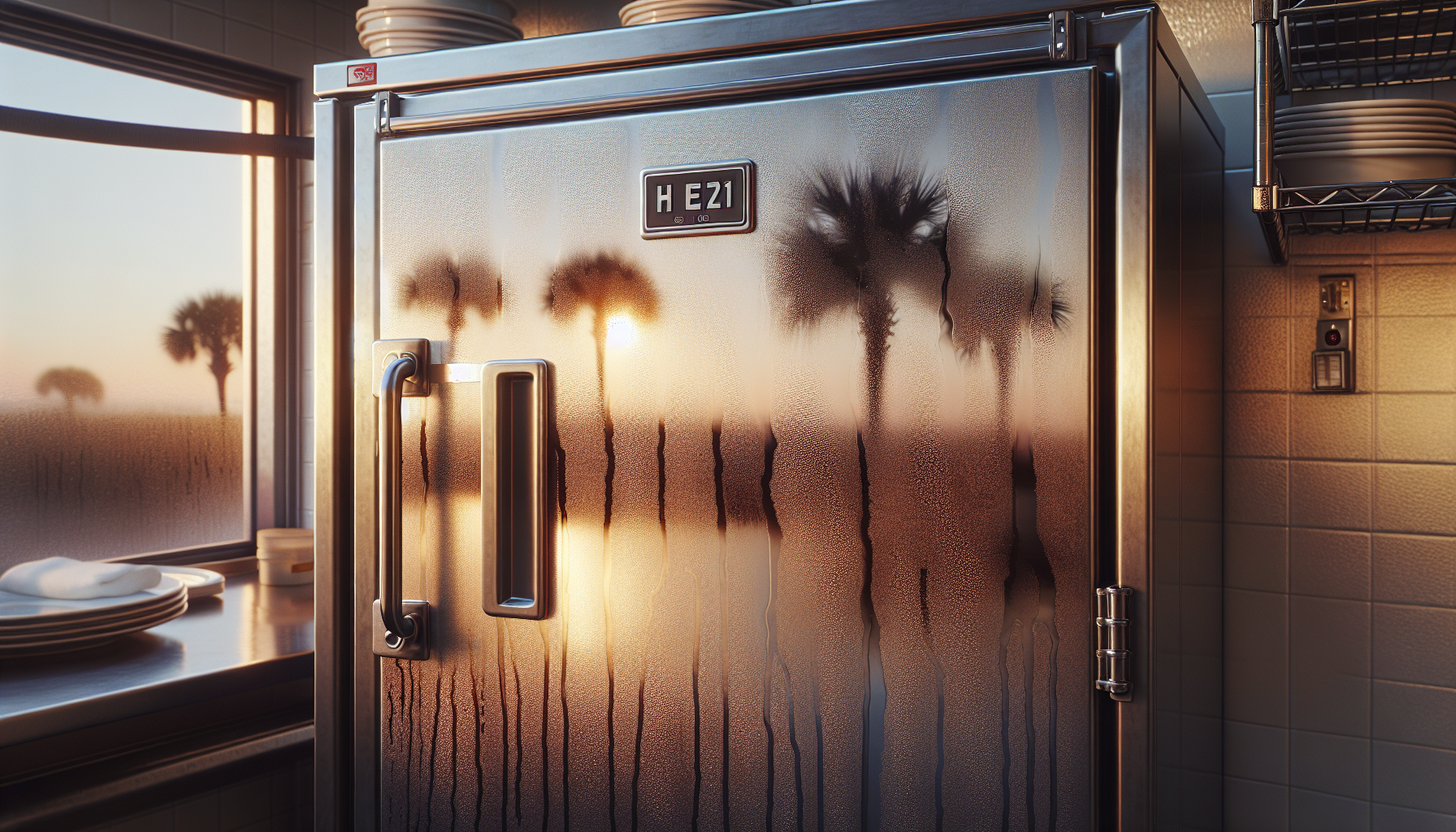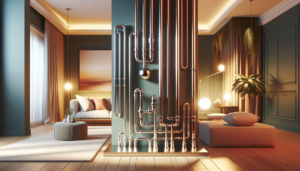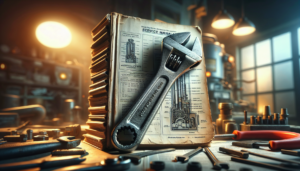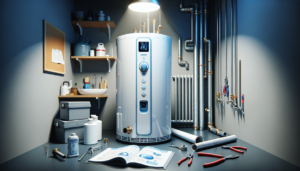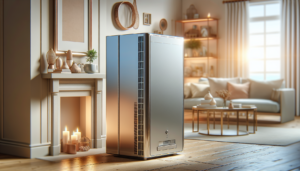? Do you want a clear plan to keep your cold food cold near Gulf Breeze, FL?
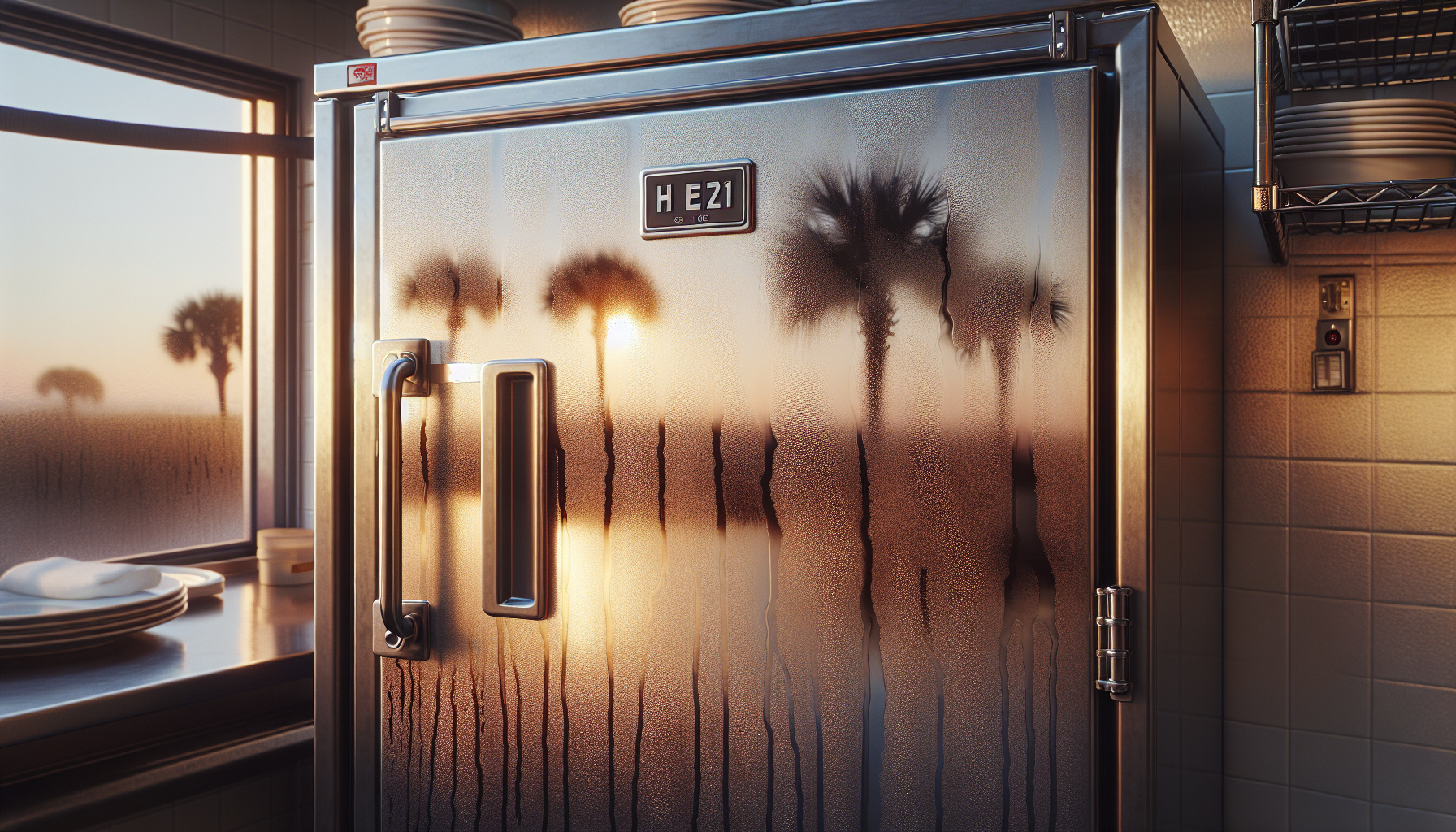
Table of Contents
ToggleCommercial Refrigeration Services Near Gulf Breeze FL
You run a business that needs cold storage. You need equipment that works. You need help when machines stop. This article will tell you how to care for your equipment. It will also tell you how to pick a good company. You will learn signs of trouble and how to act fast.
Why commercial refrigeration matters near Gulf Breeze FL
You sit near the Gulf of Mexico. You feel heat and humidity most days. Heat makes refrigerators work harder. Humidity makes ice build up faster. You need systems that resist those demands. You also need fast help when the system breaks.
How climate affects your refrigeration
You pay for electricity when compressors run more. You lose food when temperatures rise. Salt air can rust metal parts near the shore. You must inspect seals and coils more often. You must keep records so you can prove you followed rules.
Common types of commercial refrigeration systems
You will find many system types in restaurants and shops. Each type needs different care.
Walk-in coolers and freezers
You store many boxes inside a walk-in. You use these boxes for food and drinks. The unit must hold a steady temperature. You must check door gaskets and the condenser regularly.
Reach-in refrigerators and freezers
You open reach-in doors many times a day. Doors let warm air in. Frequent use stresses the compressor and gaskets. You must monitor the temperature often.
Display cases and merchandisers
You show food or drinks in display cases. Glass and lights add heat. You must keep the coils clean and the doors sealed. You must set lighting to low heat bulbs when possible.
Ice machines
You make ice for drinks and storage. You need clean water and good drainage. You must flush and sanitize the machine regularly. You must schedule plumbing checks.
Condensing units and rooftop units
You place some condensing units outside or on a roof. You must protect these from salt air and debris. You must clear leaves and mud from around them.
Central refrigeration systems
You use a central system for many coolers. You must track pressures and flow. You must check safety devices and alarms often.
Services offered by commercial refrigeration companies
You will need different services at different times. Here are common services you will see.
Installation
You buy a new unit and need it installed. A technician will place, level, and connect the unit. The tech will charge the proper refrigerant and test the system. The tech will show you how to use the controls.
Repair
You call when the unit stops cooling. Technicians diagnose the problem. They replace failed parts and test the system. They tell you what caused the issue and how to prevent it.
Preventive maintenance
You schedule routine checks to avoid breakdowns. A tech will clean coils, check refrigerant, and test electrical parts. Regular care reduces emergency calls and energy use.
Emergency service
Your freezer fails at night or on a weekend. You need help fast. A company with 24/7 service can come and save food. You must ask about after-hours fees.
Retrofit and upgrades
You upgrade older systems to use newer refrigerants. You may add better controls or efficient compressors. Upgrades can lower energy use and extend life.
Refrigerant recovery and handling
Technicians must handle refrigerant safely. They must use recovery machines and certified containers. Proper handling prevents leaks and fines.
Signs your commercial refrigeration needs service
You must watch for clear signs. You must act quickly when you see them.
- You hear loud or unusual noises. Strange sounds point to failing motors or fans.
- You see frost or ice in odd places. Ice can mean a failed defrost or a duct problem.
- You notice higher energy bills. A working unit uses less electricity than a failing one.
- You find food at unsafe temperatures. This is an immediate danger to health.
- You see water pooling or refrigerant oil. Leaks damage floors and cause loss of refrigerant.
- You smell odors from inside the machine. Bad smells can mean mold or spoiled food.
Common causes of refrigeration problems
You can fix some causes with simple checks. You need a tech for more serious issues.
Dirty condenser coils
Dirt slows heat transfer. The compressor runs longer to cool. You must clean coils often. A tech will clean coils and show you how to keep them clean.
Low refrigerant
Refrigerant leaks lower cooling power. You will see frost on evaporator tubes or warm cabinet air. A tech will find leaks and recharge the system.
Failed compressors
The compressor is the heart of the system. If it fails, the system stops cooling. A tech will test and replace the compressor if needed.
Faulty defrost systems
Defrost timers or heaters can fail. Ice builds on coils and blocks airflow. A tech will test the defrost circuit and replace parts.
Door gasket failure
Gaskets tear or harden. Warm air enters the chamber. You will see frost patterns near the door. You must replace gaskets to stop energy loss.
Electrical problems
Loose wires or failed relays can stop parts from running. A tech will check breakers and wiring. You must fix electrical faults quickly.
Thermostat or control issues
A bad control can give wrong temperature readings. You will see the unit cycle too much or stay off. A tech will test controls and replace them if needed.
What to expect during a service call
You will feel better when you know the steps. A clear process helps you plan.
- You call the company. You explain the problem and give the unit location.
- A technician arrives with tools. The tech will ask simple questions about what you saw.
- The tech inspects the system. The tech will test temperatures, pressures, and electrical parts.
- The tech explains the findings. The tech will give a clear quote with parts and labor.
- You approve the work. The tech will fix the problem and clean up the area.
- The tech tests the unit after repair. The tech will show you the unit running and leave notes.
Cost factors and price range
You will pay different amounts for different jobs. Price depends on parts, labor, and parts availability. You must ask for a clear estimate.
Typical service costs
Use this table as a guide. Prices depend on size, brand, and location. These values show common ranges.
| Service type | Typical cost range (USD) | Notes |
|---|---|---|
| Diagnostic visit | $75 – $200 | Fee may apply and be credited if you accept repair |
| Minor repairs (thermostat, gasket) | $100 – $400 | Parts and labor included |
| Compressor replacement | $900 – $3,500 | Depends on compressor type and labor |
| Refrigerant recharge | $150 – $600 | Depends on refrigerant type and amount |
| Evaporator/condenser coil clean | $100 – $400 | Regular maintenance fees may be lower |
| Emergency service call (after hours) | $150 – $600 extra | Varies by company and time |
| New unit installation | $1,200 – $20,000+ | Depends on unit size and complexity |
You should get a written quote before work starts. You should ask about warranties and guarantees.
How to choose a commercial refrigeration contractor
You should pick a contractor who stands by their work. You should check simple facts before you hire.
Check license and certifications
You should ask for HVAC and refrigeration licenses. You should verify technician certifications for refrigerant handling. You should check for local business registration.
Ask about experience
You should choose a company with local experience. You should prefer companies that have worked with your equipment brand. Experience matters in fast diagnosis and repair.
Request references
You should ask for references from similar businesses. You should call those references and ask about service quality. You should ask how the company handled emergencies.
Check response time and availability
You should ask if the company offers 24/7 service. You should ask about typical response times. Fast responses save food in an emergency.
Review warranties and guarantees
You should ask about parts and labor warranties. You should ask if the company offers a service guarantee. You should prefer companies that provide written guarantees.
Compare prices, not just the lowest
You should weigh cost against reputation and warranty. You should ask for itemized estimates. You should avoid companies that pressure you into unneeded work.
Why you should consider KadeCo Inc.
You should pick a company that cares about honesty. You should consider KadeCo Inc. for HVAC and refrigeration needs. KadeCo has roots and promises that match your needs.
KadeCo background
KadeCo Inc. started in 1997. Kade Youmans had 20 years of experience before he launched the company. He earned a universal technician certification. He built a company based on fair prices and quality work.
Company values and guarantee
KadeCo puts the customer first. KadeCo will not upsell you. KadeCo will not fix parts that do not need fixing. KadeCo offers free quotes on all jobs.
What you get with KadeCo
You get honest technicians who know HVAC and refrigeration. You get clear quotes and prompt service. You get a company that will recommend another firm if they cannot do the job.
KadeCo Inc
209 Brandywine Rd
Pensacola, FL 32507
(850) 516-7552
You can call KadeCo for installations, repairs, maintenance, or emergencies. You should ask about their availability for Gulf Breeze service calls.
Preventive maintenance checklist
You should create a simple schedule for staff and technicians. A clean plan prevents many problems.
Daily tasks
You should record temperatures in each unit. You should close doors quickly after use. You should remove trash and food spills from around the unit.
Weekly tasks
You should wipe door gaskets and check for cracks. You should inspect drain lines for clogs. You should clean light bulbs and remove debris from vents.
Monthly tasks
You should clean condenser coils if you see dirt. You should test defrost cycles and timers. You should check fan motors and blades.
Quarterly tasks
You should perform a fuller inspection of electrical connections. You should check refrigerant pressures. You should test safety controls and alarms.
Yearly tasks
You should schedule a professional full tune-up. You should test the compressor and motors. You should replace worn parts and update records.
Use this table to share tasks with staff and technicians.
| Frequency | Tasks |
|---|---|
| Daily | Record temps, close doors, remove spills |
| Weekly | Clean gaskets, check drains, clear vents |
| Monthly | Clean coils, test defrost, inspect fans |
| Quarterly | Check electrical, check refrigerant, test alarms |
| Yearly | Full professional tune-up, part replacement |

Energy saving tips for commercial refrigeration
You can cut costs with small habits. You can keep your food safe and your bills lower.
- You should set thermostats to needed temperatures and not colder. Colder settings waste energy.
- You should keep doors closed and limit door openings. You should train staff to plan access and retrieve items quickly.
- You should replace torn gaskets. New gaskets stop warm air from entering.
- You should install strip curtains for walk-ins. Curtains reduce air exchange.
- You should use LED lighting in display cases. LED lights make less heat.
- You should schedule regular coil cleaning. Clean coils reduce compressor run time.
- You should consider variable-speed compressors for large systems. These can save energy over time.
Food safety and compliance
You must keep food safe for customers and for inspections. You must follow simple temperature rules.
- You must store refrigerated food at 41°F (5°C) or below. You must store frozen food at 0°F (-18°C) or below.
- You must log temperatures and keep records. Records help during inspections and insurance claims.
- You must follow local codes and federal rules about refrigerant. You must hire certified technicians for refrigerant work.
- You must label and track repairs and parts replaced. You must keep service records for warranty claims.
Safety and refrigerant handling
You must treat refrigerant work as serious. You must allow only trained people to handle it.
- You must hire certified technicians for refrigerant recovery. The tech will use proper recovery equipment.
- You must avoid open flames near refrigerant. Some refrigerants become toxic at high temperatures.
- You must ensure proper ventilation when you work on large units. The tech will monitor air quality.
- You must dispose of old refrigerant and parts according to law. The tech will follow required steps.
Emergency plan for refrigeration failure
You must act quickly when a unit fails to save food and money. You must have a plan that staff can follow.
- You must call an emergency service. You should call a company with fast response times.
- You must move high-risk food to a working fridge or freezer. You should use coolers with ice if needed.
- You must document the time and temperature. You should photograph the unit and record actions.
- You must throw out food that stayed too warm too long. You should follow health rules to avoid illness.
- You must ask for a written repair report. You should file claims with your insurer if needed.
What parts wear out most often
You will see the same parts fail across many units. You should plan for replacements.
- Door gaskets wear out. You should replace them when cracked.
- Fan motors and blades fail from dust and humidity. You should inspect fans often.
- Start relays on compressors fail. You should test relays during service.
- Thermostats and sensors drift or fail. You should calibrate and replace them if needed.
- Evaporator and condenser coils corrode or clog. You should clean and replace coils as needed.
Questions you should ask a technician
You should ask clear, short questions. You should get clear, short answers.
- What is the likely cause? You want a simple explanation.
- What parts do you need? You want a list and price for each.
- How long will the repair take? You want a time estimate.
- What warranty do you offer? You want a written warranty.
- Can you show proof of license and refrigerant certification? You want to verify credentials.
- Do you offer maintenance plans? You want a plan that fits your budget.
Frequently asked questions (FAQ)
You will see common questions from other business owners. These answers stay simple.
Q: How often should I schedule maintenance?
A: You should schedule professional maintenance at least twice a year. Heavy use may require quarterly visits.
Q: How long does a typical repair take?
A: Small repairs can take one hour. Major repairs, like a compressor change, can take several hours or a day.
Q: Can I keep food safe during a repair?
A: You can move food to another working unit or use coolers with ice. You should document temperatures.
Q: How do I save on energy bills?
A: You can set proper temperatures, keep doors closed, and clean coils. Small steps add up.
Q: What if I disagree with a technician’s diagnosis?
A: You can ask for a second opinion. KadeCo will recommend another firm if they cannot help.
Simple tips for staff training
You should train staff to protect your cold goods. You should keep training short and clear.
- Show staff how to read temperature logs. You should make the log easy to fill.
- Teach staff to close doors quickly. You should practice quick pulls and returns.
- Teach staff to report odd noises or leaks. You should create a simple reporting form.
- Assign one person to check gaskets and drains weekly. You should make a short checklist.
Comparing local options
You will have several local companies to choose from. You should compare the same items before you decide.
| Feature | What you want | How KadeCo performs |
|---|---|---|
| Local experience | Local knowledge and quick response | KadeCo has deep local experience since 1997 |
| Pricing | Clear, honest estimates | KadeCo will not upsell and offers free quotes |
| Availability | Emergency service and fast calls | KadeCo offers prompt service and will help you |
| Guarantees | Written parts and labor warranty | KadeCo guarantees honesty and customer-first service |
| Certifications | Proper refrigerant and HVAC certifications | KadeCo technicians are certified and experienced |
Final steps after a repair
You should keep records and watch the unit after repair. You should follow these steps.
- You should keep the repair invoice and notes. You should file them with other equipment records.
- You should check the unit daily for a week. You should log temperatures and any odd signs.
- You should schedule a follow-up service if you see anything strange. You should not wait until the next routine check.
Closing recommendation
You deserve a service company that tells you the truth. You should choose a company that puts your needs first. For commercial refrigeration services near Gulf Breeze, FL, you should call KadeCo Inc. You will get honest work at a fair price. You will get free quotes and technicians who will not try to sell you things you do not need. You will get a company that has served customers since 1997 and that will help you protect your food and your business.
KadeCo Inc
209 Brandywine Rd
Pensacola, FL 32507
(850) 516-7552
Call KadeCo for installation, repair, maintenance, or emergencies. You will get clear answers and honest work. You will get help to keep your cool and keep your customers safe.


